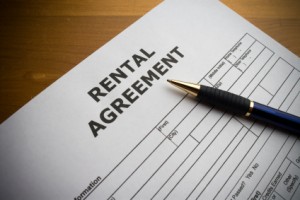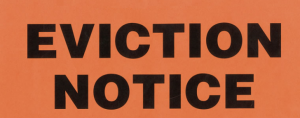Posted by Teresa on July 1, 2011 under Eviction, Lease and Rental Agreements | 
 While a lease agreement and landlord/tenant relationship is a strictly business arrangement, landlords sometimes have to deal with a tenant’s personal problems. Loss of a job, a need to break a lease and move to another city, and other life situations cross the line into a personal nature.
While a lease agreement and landlord/tenant relationship is a strictly business arrangement, landlords sometimes have to deal with a tenant’s personal problems. Loss of a job, a need to break a lease and move to another city, and other life situations cross the line into a personal nature.
When tenants have protective orders against spouses, partners, or acquaintances, the landlord may not even know. However, when the other party violates the order and enters the rental property, problems can ensue all around.
One tenant in California was faced with eviction when her husband, from whom she was separated, threatened and stalked her at her apartment. Police were called and the tenant obtained a restraining order, but the property manager informed her she needed to move to avoid upsetting her fellow tenants.
In California, and most other states, a protective order protects tenants from repercussions such as eviction. Domestic violence that has been documented, as in this case, is not a reason for terminating a lease. But what if the tenant had allowed the stalking troublemaker onto the property? That’s another story. If the tenant is voluntarily subjecting other tenants and the property to possible harm by allowing a dangerous person onto the premises, eviction may be warranted.
Under Federal guidelines for Section 8 owners, landlords may not refuse to rent to an applicant solely because he or she is a victim of domestic violence, dating violence or stalking. Nor can the tenant be evicted, even if criminal acts (such as property damage) related to the domestic or dating violence or stalking, are caused by the tenant or a guest. There is an exception for cases in which there is an actual or imminent threat to other tenants or employees of the property if the tenant is not evicted.
Many states follow the federal guidelines, but if you need guidance on a situation, it’s best to check with a local law official or landlord/tenant attorney for advice.
It’s not easy to be privy to the personal problems of tenants, but at times a landlord can’t avoid it. It’s important to know what is and is not allowed when dealing with legalities such as restraining orders.
Legal disclaimer:
The contents of this article are intended for general information purposes only, and should not be relied upon as a substitute for obtaining legal advice applicable to your situation.
Posted by Teresa on May 31, 2011 under Eviction, Lease and Rental Agreements | 
 A young college student in Orlando moved out of a shared apartment before the lease was up. She left several pieces of valuable stereo equipment behind because she had no room for it in her new apartment. When the lease expired, her roommates moved out and left her property in the unit. The landlord then discovered the stereo equipment and that she’d painted her bedroom without permission.
A young college student in Orlando moved out of a shared apartment before the lease was up. She left several pieces of valuable stereo equipment behind because she had no room for it in her new apartment. When the lease expired, her roommates moved out and left her property in the unit. The landlord then discovered the stereo equipment and that she’d painted her bedroom without permission.
The landlord informed the former tenant that she would not get her property back because she left it for so long and had painted her room. She offered to give the equipment back if the former tenant repainted the room to match the rest of the rental unit.
What was this landlord thinking?
In most jurisdictions, it is not legal to hold a tenant’s property in return for back rent or repairs. Nor is it the landlord’s responsibility to serve as a storage business for a former tenant’s property. This landlord could assume the property was abandoned. And that the tenant never read the lease clause where she agreed to ask for permission before painting. Still, holding property for ransom is not allowed.
Recently, a landlord in Minneapolis ranted about a tenant on his Facebook page. While he didn’t use any names, the description was clear enough—especially since the complaint was about hearing loud outbursts from a tenant’s developmentally challenged child. Not only was this heartless, it was not smart. The description narrowed the possibilities down to one.
What was this landlord thinking?
There is no substitute for discretion when you’re a landlord. Tenant issues should be confidential. And of course this landlord chose the wrong venue to discuss a tenant problem! Facebook posts have a way of going beyond your circle of friends. Plus, there’s no way to know who your friends’ friends are. In this case, the tenant caught wind of the rant and consulted a lawyer.
A landlord in California did not require a tenant to sign a new lease when her boyfriend and his toddler son moved into her apartment. She completed a new lease application and paid the fee, and assumed he had been added. However, she didn’t question that no new lease ever appeared for her to sign. Her rent checks were paid from a joint account under both her and her boyfriend’s names.
Eventually, the tenant discovered some peeling paint and, because the building was old, she tested it with a home lead paint detection kit. The results were positive. She filed a complaint with the landlord, who claimed she was not entitled to action because the boyfriend was not on the lease, and that he and the young child were squatters. The landlord threatened eviction. The tenant countered that she filled out an application and paid a fee, but had no copy of the application or of the $35 payment.
What was this landlord thinking?
Especially in California, every interaction with tenants should be in writing. In this case, the tenant probably has a case that she is being retaliated against because of the lead paint complaint. Both sides should have kept better records, but when it comes to eviction, a landlord should have documentation to back up every claim.
Legal disclaimer:
The contents of this article are intended for general information purposes only, and should not be relied upon as a substitute for obtaining legal advice applicable to your situation.
Posted by Teresa on May 28, 2011 under Eviction, Lease and Rental Agreements | 
 The Chicago Housing Authority is proposing a new rule that all adult tenants will need to be drug tested, and if they test positive, eviction proceedings will begin. While some private landlords would welcome the opportunity to test and then evict illegal drug users, more have to deal with tenants who smoke pot.
The Chicago Housing Authority is proposing a new rule that all adult tenants will need to be drug tested, and if they test positive, eviction proceedings will begin. While some private landlords would welcome the opportunity to test and then evict illegal drug users, more have to deal with tenants who smoke pot.
If you’ve noticed the distinctive smell of marijuana wafting out of your rental properties, how did you handle it? Some might think that smoking pot is as harmless as drinking a beer, but it’s still illegal. And if you’re ignoring a tenant’s drug use, you could be putting your business at risk.
Did you know that illegal drug use by tenants in your rental units could subject you to related property damage and personal injury suffered by other tenants or the public? Is it worth it to you?
Your best move as a landlord is to include a clause in your lease agreement that tenants agree to not violate any applicable laws, including the possession, use or sale of illegal drugs. If and when a tenant violates the lease by choosing to smoke marijuana, you have the grounds to evict.
Some landlords might think evicting over pot smoking is overkill. But allowing it can leave you open to litigation; the potential for harm is just too great. Besides, if you can smell marijuana, your other tenants probably can, too. What message are you sending if you fail to enforce the law, as well as the terms of your lease agreement?
Posted by Teresa on October 22, 2010 under Eviction, Landlord and Tenant FAQs | 
 Have you ever needed to break a lease with a tenant? We’ve heard from a few landlords who did just that, for different reasons:
Have you ever needed to break a lease with a tenant? We’ve heard from a few landlords who did just that, for different reasons:
Nancy rented out her home in Virginia when her husband was transferred to San Jose, CA. Six months later, he was laid off from his job and they returned to their hometown. Financial difficulties kept them from buying another house. Nancy and her husband wanted to move back into their home, but their tenant still had several months left on the one-year lease they signed when they moved.
Jerry rented an apartment above his business to the son of a friend. At first, everything worked out well—but soon, the tenant started paying rent a few days late, didn’t keep the apartment clean, and made way too much noise during Jerry’s business hours. He didn’t want to evict his friend’s son, but realized he made a mistake signing a one-year lease with him.
Steve’s situation was the opposite—he had a tenant who purchased a home and wanted to break the lease three months early. Steve’s first inclination was to say “no” and require the tenant to pay all three months’ rent. But the tenant had been great—never late with rent, quiet and no trouble—and he didn’t want to punish her. He was just concerned about renting the unit again.
Nancy and Jerry handled their problem with the same solution—they incentivized their tenants to voluntarily break the lease. Nancy calculated how much she and her husband were willing to offer before picking up the phone and calling the tenant. She explained the situation, offered to help the tenant find another place to live, and then asked if he would be willing to move out early. He accepted her offer of assistance and cash, and all was well.
Jerry also offered his friend’s son an incentive to move out. He had a talk with him, explained that it wasn’t working out but he didn’t want to evict him, and gave him the rest of the month (about 20 days) in free rent if the tenant agreed to move out. (And Jerry never rented to a friend or a friend’s kid again.)
Steve wanted to end his relationship with his tenant on a good note. He calculated the three months’ rent, inspected the unit and found that it was in good shape, and offered to let the tenant out of the lease in exchange for keeping the security deposit and one month’s rent. She quickly agreed, and recommended the apartment to a co-worker, who signed a lease with Steve soon after.
It is possible to break a lease with a tenant, whether it’s you or the tenant who wants it broken. Usually a little incentive does the trick—but it doesn’t hurt to be reasonable, polite and open-minded! The next time one of your tenants wants to break a lease, think about solutions rather than problems. You might be surprised to see that it can work out for both parties.
Posted by Teresa on October 20, 2010 under Eviction, Landlord Tips | 
 Eviction is typically the last step a landlord wants to take with a tenant. But it’s a reality in the real estate investment business. Most experienced landlords say the biggest mistake they make around eviction is waiting too long to start the proceedings.
Eviction is typically the last step a landlord wants to take with a tenant. But it’s a reality in the real estate investment business. Most experienced landlords say the biggest mistake they make around eviction is waiting too long to start the proceedings.
So if you’re a landlord who is heading down the road toward evicting a tenant, here are 5 things you should know:
- Eviction comes after you legally terminate the tenancy. The requirements for giving a tenant notice that the tenancy has been terminated varies by state; every landlord should know the regulations in his or her state. Usually, a written notice is required, for example, a notice that the tenant pay the rent due by the 5th or the eviction lawsuit will proceed. (This is a “pay or quit” notice.)
- Every state has its own requirements for how eviction papers are written and served, too. Look up your state law on eviction; read it thoroughly. Ask an attorney to explain it if any statute or requirement is unclear.
- Many rental property owners advise new landlords to hire a landlord/tenant attorney to handle your first eviction to make sure that everything is done correctly. You don’t want your case thrown out of court because you’ve missed a legal notice or mixed up the number of days you are required to give the tenant to correct the problem.
- If your tenant fights the eviction, your case could take many weeks or months to go through the courts. Every notice, every complaint, and your history as a landlord could be scrutinized. It’s vitally important that you keep excellent records, treat every tenant equally and abide by your state and local laws throughout the entire eviction process.
- Depending on your state, you may have responsibilities after an evicted tenant moves out. In some states, the property owner is required to store a tenant’s left-behind property and notify them for a minimum time period before disposing of it.
It’s not easy to evict a tenant—for a reason. Forcing a person or family out of their home is not taken lightly. Be well-prepared if you must evict—and to reduce the probability of needing to evict, be sure to order a thorough tenant screening before you sign a lease with a potential tenant.
Legal disclaimer:
The contents of this article are intended for general information purposes only, and should not be relied upon as a substitute for obtaining legal advice applicable to your situation
Posted by Teresa on June 8, 2010 under Eviction, Tenant Screening & Background Checks | 
 Elaine is a responsible, no-nonsense landlord. Her leases are clear and thorough, and her tenants generally live by her rules. Every now and then, however, Elaine signs a lease with a tenant who unexpectedly starts causing trouble—despite her checking the tenant’s rental history, criminal background, and credit.
Elaine is a responsible, no-nonsense landlord. Her leases are clear and thorough, and her tenants generally live by her rules. Every now and then, however, Elaine signs a lease with a tenant who unexpectedly starts causing trouble—despite her checking the tenant’s rental history, criminal background, and credit.
This time it’s a young woman who is simply too loud. She plays her TV at top volume, listens to bass-busting music late at night, and has way too many parties with her also-loud friends.
Elaine has reminded the young tenant about her rules on disturbing the peace. She’s asked her to discontinue the behavior. And now, other tenants are complaining. Elaine is ready to issue a Three-Day Notice to Quit. Is that her best option?
According to our sources, no. This non-conditional notice is generally used when whatever is happening to breach the lease cannot be corrected. Examples include illegal behavior like selling drugs, irreparable damage to the property, or subleasing the property without permission. The notice tells the tenant that if they are not out in three days, eviction proceedings will begin.
In this case, Elaine’s tenant could still correct her problem—just by quitting the loud parties and turning down her stereo equipment. Therefore, a Three-Day Notice to Perform Covenant or Quit is the better recourse. It must specifically state the behavior that breaches the lease so the tenant can correct it.
Then if the problem continues over the three-day period, Elaine can start eviction proceedings. But what if the tenant quiets down for three days, and turns up the volume again? Hopefully, the threat of eviction is enough to inspire behavior modification in this tenant. If not, another Three-Day Notice to Perform Covenant can be issued. After a few of these, it might be time for the Three Day Notice to Quit!
Legal disclaimer:
The contents of this article are intended for general information purposes only, and should not be relied upon as a substitute for obtaining legal advice applicable to your situation. Always consult your legal advisor for your particular situation.
Posted by Teresa on February 18, 2010 under Eviction, Landlord Paperwork and Forms, Landlord Tips | 
 Depending on the state in which your property sits, you can probably collect back rent and damages from former tenants through wage garnishment.
Depending on the state in which your property sits, you can probably collect back rent and damages from former tenants through wage garnishment.
Garnishment of wages is done through the courts, after a judgment is made against the debtor. The debtor’s employer is ordered to withhold a portion of his or her wages, and turn them over to the court, to be disbursed to the creditor.
The question most landlords ask is if the amount of money in question is worth the time, trouble and expense of the court proceedings required. The best way to determine this is to obtain an accounting of the fees involved: usually there are court costs, process server fees, filing fees, and attorney’s fees—unless no attorney is involved.
As with eviction proceedings, many landlords hire a landlord/tenant law specialist to file garnishment papers the first time, and then decide whether or not they can handle the process themselves. And that’s a personal decision, just like deciding what dollar amount makes the court action “worth it.” Every landlord is different in this respect. Once you determine the out-of-pocket costs, you can then make your decision.
Obtaining a judgment is one thing, but if the tenant has no means to pay it, you may never see the funds owed to you—and working hard to collect them could be a huge waste of your time. And it should go without saying that your former tenant needs to be employed in order for his or her wages to be garnished.
There are other factors to consider in making a decision to garnish a tenant’s wages:
- Do you have the tenant’s new address? If not, filing will be very difficult.
- Have they moved out of state? Again, filing becomes more complicated.
- Do they have other garnishments, such as for child support payments? Other garnishments must be satisfied first.
- Is the tenant’s income below the poverty line? If so, they are exempt.
If you decide to file for a Writ of Garnishment, you’ll need to gather all the tenant paperwork, including the lease application, the lease or rental agreement, proof of rent payment, proof of any notices to Pay or Quit, eviction papers, and notes from conversations and electronic communications.
The contents of this article are intended for general information purposes only, and should not be relied upon as a substitute for obtaining legal advice applicable to your situation.
Posted by Teresa on February 16, 2010 under Eviction, Landlord and Tenant FAQs | 
 Christopher is no newbie landlord. He has purchased and rehabbed several properties in his city, and is running his investment property business full time. His tenants are a mix of couples, families, and singles from every income tier and diverse backgrounds. He’s had his share of problem tenants, but the only real problems he’s had to face are late rent payments.
Christopher is no newbie landlord. He has purchased and rehabbed several properties in his city, and is running his investment property business full time. His tenants are a mix of couples, families, and singles from every income tier and diverse backgrounds. He’s had his share of problem tenants, but the only real problems he’s had to face are late rent payments.
Until a few months ago. Christopher surprised a tenant—although completely unintentionally—and discovered signs of drug use in his property. Here’s what happened: while doing some routine maintenance at Apartment #1 of a duplex, he realized he needed to shut off the water main. Unfortunately, the main fed both living units. So Christopher knocked on the door of Apartment #2 to see if anyone was home, and to let them know the water would be off for a few minutes.
When his tenant opened the door, she appeared surprised at seeing Christopher; she quickly stepped out and closed the door behind her. While Christopher maintained his tenant’s privacy by not looking into the apartment, he couldn’t help but notice the odor wafting out the door and into his nostrils! It was definitely marijuana.
Christopher informed the tenant of the impending water shut off and left, feeling conflicted about how to handle the situation. But he soon made a decision.
If you were the landlord what would you do?
A. Nothing. Marijuana should be legal.
B. Nothing. If the tenant is not hurting anyone, it’s none of my business.
C. Have a talk with the tenant. Let her know that illegal drugs are not tolerated on my property and give her written warning that the next time it happens, I will start eviction proceedings.
D. Start eviction proceedings immediately. Illegal drug use harms all my tenants and the community and could make me liable for any related property damage or personal injury.
Christopher chose door D. Backed by a solid rental agreement that clearly states illegal drugs are not allowed on his property, Christopher did what he always did when it came to handling tenant issues: he enforced the terms of the lease, as agreed to by the tenant.
Christopher did not want to evict this tenant. He had no prior issues with her, and she paid her rent on time. But he strongly believes in treating all tenants equally and enforcing his lease and tenant rules fairly. He felt he had no choice other than to evict this lease-breaking tenant.
The outcome of this story? While evicting tenantsis never pleasant, Christopher discovered he did it just in time to prevent the occupants of Apartment #1 from moving away. Turns out they had noticed marijuana odors from the apartment next door for months and no longer wanted their kids subjected to it. When they discovered their neighbor had been evicted, they thanked Christopher for keeping of the duplex drug-free and enforcing the lease.
Posted by Teresa on January 15, 2010 under Eviction, Tenant Screening & Background Checks | 
On this site, we’ve covered the importance of clear rental agreements and leases a dozen times or more. And we’ve stated that the relationship between landlord and tenant is strictly a business one. Never does that distinction become more important than when it’s time to evict a tenant.
Even landlords who choose tenants very wisely, who run all the right credit checks and background screening checks, and who have good, professional relationships with their tenants will face the inevitable eviction soon or later. And, if that landlord is a compassionate person, he or she might not feel good about doing it.
This economy has made it tough for everyone. Tenants are losing jobs and landlords are having a hard time filling rental vacancies—there’s no doubt the business has changed drastically over the past year. But even in this economy, landlords must look at eviction as a business decision—hard as that can be.
Is it okay to evict a tenant in this terrible job and rental market? The answer is “yes.” If you’re in doubt, pull out the rental or lease agreement. Read it over. Check off the terms and conditions that your tenant has failed to honor. Remind yourself that when your tenant signed that lease agreement, he or she agreed to abide by each of those terms and conditions. And they agreed that if they broke the agreement, you had the right to take action, including eviction.
You took a chance that the tenant would uphold their end of the bargain, just as you performed all the duties you agreed to. In approving this tenant, you conducted your due diligence, mitigated your risk through tenant screening, and verified employment and credit worthiness. Though it was based in smart business practices, you still took a chance.
When it turns out that the tenant and you both made a mistake in entering into the agreement, then choosing to evict is okay. When it turns out that, despite the best efforts on both sides, the terms of the rental agreement cannot be upheld by the tenant, then choosing to evict is okay. Making the best business decision you can when a tenant breaks the rental agreement is okay.
This is just one reason a strong rental or lease agreement is the foundation of every landlord/tenant relationship.
 On this site, we’ve covered the importance of clear rental agreements and leases a dozen times or more. And we’ve stated that the relationship between landlord and tenant is strictly a business one. Never does that distinction become more important than when it’s time to evict a tenant.
On this site, we’ve covered the importance of clear rental agreements and leases a dozen times or more. And we’ve stated that the relationship between landlord and tenant is strictly a business one. Never does that distinction become more important than when it’s time to evict a tenant.
Even landlords who choose tenants very wisely, who run all the right credit checks and background screening checks, and who have good, professional relationships with their tenants will face the inevitable eviction soon or later. And, if that landlord is a compassionate person, he or she might not feel good about doing it.
This economy has made it tough for everyone. Tenants are losing jobs and landlords are having a hard time filling rental vacancies—there’s no doubt the business has changed drastically over the past year. But even in this economy, landlords must look at eviction as a business decision—hard as that can be.
Is it okay to evict a tenant in this terrible job and rental market? The answer is “yes.” If you’re in doubt, pull out the rental or lease agreement. Read it over. Check off the terms and conditions that your tenant has failed to honor. Remind yourself that when your tenant signed that lease agreement, he or she agreed to abide by each of those terms and conditions. And they agreed that if they broke the agreement, you had the right to take action, including eviction.
You took a chance that the tenant would uphold their end of the bargain, just as you performed all the duties you agreed to. In approving this tenant, you conducted your due diligence, mitigated your risk through tenant screening, and verified employment and tenant credit history. Though it was based in smart business practices, you still took a chance.
When it turns out that the tenant and you both made a mistake in entering into the agreement, then choosing to evict is okay. When it turns out that, despite the best efforts on both sides, the terms of the rental agreement cannot be upheld by the tenant, then choosing to evict is okay. Making the best business decision you can when a tenant breaks the rental agreement is okay.
This is just one reason a strong rental or lease agreement is the foundation of every landlord/tenant relationship.
Posted by Teresa on July 17, 2009 under Eviction, Landlord Tips, Tenant Screening & Background Checks | 

Whether you’re an experienced landlord, or a “newbie,” you probably have your share of missteps made in your rental property business. And while some landlords make the same mistakes over and over again, you don’t have to be that guy or gal.
We’ve rounded up a list of common landlord mistakes so you can avoid them!
1. Not treating it like a business. Because it is! You are in the property rental business to make money, not to house the world at your expense. Establish and follow procedures, open separate bank accounts, keep meticulous records, get professional help when necessary, and project a professional demeanor to your tenants. As one landlord put it, “If you look and sound like you’re not serious, you won’t be taken seriously.”
2. Being too lenient on rent collection. Your tenants signed an agreement to pay you on a certain date. Don’t allow late or partial rent, or they will know you’re not serious about the due date. See mistake #1.
3. Failure to prescreen tenants. Don’t be in a hurry to fill a vacancy, or you could end up with an unreliable tenant—which is a much bigger problem than an empty unit. Have your employment checks, background checks and credit checks in hand before you sign a lease with any tenant.
4. Lack of understanding about operating expenses. There is more to owning rental property than collecting rent and paying the basics: principle, interest, taxes, and insurance. If you don’t have sufficient resources to cover regular expenses (maintenance, advertising, repairs) PLUS accessible funds to cover the occasional (but inevitable) major repairs, you are setting yourself up for failure.
5. Trying to do everything yourself. If you have only one or two properties to manage, you might be able to handle rent collection and upkeep. Still, you might need a handyman for maintenance. But if you have more than three rental properties, consider hiring a property management company for tenant screening and placement, upkeep, rent collection, maintenance, etc. Ask yourself what your time is worth. You may find the expense of a management company is well worth your freedom from stress.
6. Not having an exit strategy. Before you buy an income property, do your homework—including how easy or difficult it will be to sell when you need or want to. You never know when you’ll want out of a rental property, but the likelihood is that you will sell eventually.
7. Not evicting non-paying tenants immediately. Even if you properly screen tenants, anything can happen. If your tenants break the rental agreement by not paying on time, you can—and should—take the proper legal steps for eviction. See mistakes #1 and #2.
8. Being a hands-off landlord. Although you may have a property management company, no one will care about your rental properties like you do. At the very least, inspect your properties on a regular basis and stay in touch with your tenants. You’ll probably prevent a lot of damage and trouble just by following this simple step.
 While a lease agreement and landlord/tenant relationship is a strictly business arrangement, landlords sometimes have to deal with a tenant’s personal problems. Loss of a job, a need to break a lease and move to another city, and other life situations cross the line into a personal nature.
While a lease agreement and landlord/tenant relationship is a strictly business arrangement, landlords sometimes have to deal with a tenant’s personal problems. Loss of a job, a need to break a lease and move to another city, and other life situations cross the line into a personal nature.




 Depending on the state in which your property sits, you can probably collect back rent and damages from former tenants through wage garnishment.
Depending on the state in which your property sits, you can probably collect back rent and damages from former tenants through wage garnishment.
